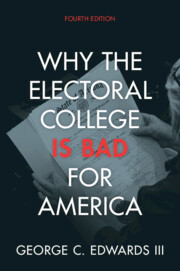Book contents
- Why the Electoral College Is Bad for America
- Why the Electoral College Is Bad for America
- Copyright page
- Dedication
- Contents
- Tables
- Preface
- 1 Raising Questions
- 2 How the Electoral College Works
- 3 The Electoral College and Political Equality
- 4 Contingent Elections
- 5 The Origins of the Electoral College
- 6 Protecting Interests
- 7 Maintaining Cohesion
- 8 Preserving the Party System
- 9 Conclusion
- Appendix US Constitutional Provisions Relating to Presidential Elections
- Notes
- Index
- References
2 - How the Electoral College Works
Published online by Cambridge University Press: 09 November 2023
- Why the Electoral College Is Bad for America
- Why the Electoral College Is Bad for America
- Copyright page
- Dedication
- Contents
- Tables
- Preface
- 1 Raising Questions
- 2 How the Electoral College Works
- 3 The Electoral College and Political Equality
- 4 Contingent Elections
- 5 The Origins of the Electoral College
- 6 Protecting Interests
- 7 Maintaining Cohesion
- 8 Preserving the Party System
- 9 Conclusion
- Appendix US Constitutional Provisions Relating to Presidential Elections
- Notes
- Index
- References
Summary
The electoral college is an extraordinarily complex mechanism for selecting a president. State and national laws drawn to implement the electoral college system have only added to the complexity—and the risks of a malfunction. The allocation of electoral votes among the states may not accurately represent the citizens resident in those states. Electors are not wise elites, and they may make errors or violate their charges when casting their votes. The constitutional provisions and laws required to implement the electoral college are open to multiple interpretations and may well involve Congress and the courts in partisan wrangling over which candidate won a state and which electoral votes to count. Their decisions may misrepresent the public’s wishes. Donald Trump’s attempts both to create alternative slates of electors and to reject certified electors from states won by Joe Biden could only occur because there was an electoral college. The absence of a right to vote in presidential elections is certainly inconsistent with our notions of democracy. Similarly, the selection of the ultimate choosers of the president—electors—by party committees is contrary to our notions of transparency and popular participation. Allowing a state legislature to choose the winning slate of electors of a state makes a mockery of popular selection of the president.
Keywords
- Type
- Chapter
- Information
- Why the Electoral College Is Bad for America , pp. 18 - 44Publisher: Cambridge University PressPrint publication year: 2023

